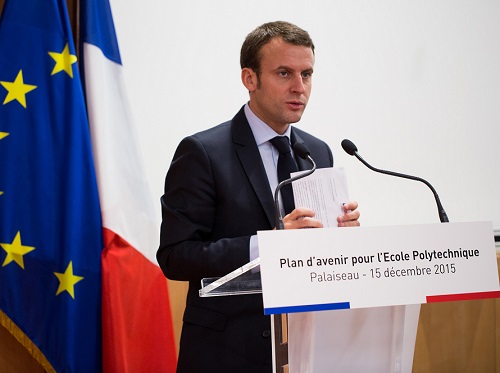
French citizens will choose a new president this Sunday, and one of them – Emmanuel Macron – recently announced that, if elected, he will urge the European Union to impose sanctions against the nation of Poland. Polish writer Marcin Rzegocki asks “Does Macron want the EU to punish Poland for its charity or its success?” in a new commentary for Religion & Liberty Transatlantic.
Macron said he would ask the EU to punish Poland for its refusal to admit its prescribed share of mostly Muslim refugees fleeing war-torn Syria. Instead, the nation of Poland came up with a more personal, more effective, private charitable undertaking to aid refugees of all religious backgrounds. Pope Francis recently commended it.
The French presidential candidate apparently believes this to be insufficient. But Rzegocki brings to light the economic subtext behind Macron’s threat, little reported elsewhere. He writes:
To understand Macron’s remarks, it is crucial to understand their context. The conference took place in a Whirlpool plant in Amiens just before it is relocated to Łódź in central Poland. Candidate Macron accused Poland and Hungary of “doing nothing” in face of the refugee crisis which threatens the Old Continent. It is clear that Macron intended his tough talk to raise his popularity among French workers. …
Thanks to the free movement of people and capital inside the EU, central European countries like Poland, the Czech Republic, and Hungary became competitive against countries like France and Italy due to lower costs of employing its workforce, lower taxation, well-educated professionals, and other resources. This led to the “problem” – as the French and Italians see it – of businesses relocating further to the East. According to Eurostat, as of December 2016, the unemployment rate in Poland was 5.9 percent, while in France it was 9.6 percent.
Instead of fighting against the real problems underlying this situation, both French presidential candidates opt for short-term interventionist policies and political sanctions.
This confirms the classical liberal notion that economic engagement flowers into positive foreign relations, and vice-versa. Charity can do the same, if handled correctly, Rzegocki notes. Poland’s alternate plan to help refugees seems to accomplish this:
The charitable organization Caritas Polska launched another program aiming to help the people in need in Middle East called Rodzina Rodzinie, which means “Family for Family” in Polish. … The program has already won plaudits that anyone would covet – from the Holy See. During the April 23 Regina Caeli prayer in Vatican, Pope Francis commended the Rodzina Rodzinie program and thanked Caritas Polska for this initiative.
“I greet the Polish pilgrims and express heartfelt appreciation for the initiative of Caritas Poland in support of many families in Syria,” Pope Francis said. …
Muslim families in need are also included in the Christian program – which is often surprising to them.
This helps refugees where they live, something supported by most Syrians, as well as their Christian leaders. For instance, the Orthodox Christian Patriarch of Antioch, John X, told the president of Poland last year, “Christians, to survive, need help, on site, in the Middle East.” This satisfies concerns from the Polish government – and the Polish church – that the immigrants may harbor Islamist sentiments. “In all countries receiving refugees, the programs aimed at the integration failed completely. Therefore, we believe that this program is the best solution,” said Bishop Krzysztof Zadarko of the Polish Episcopal Conference.
In his essay, Rzegocki details Poland’s Rodzina Rodzinie program, which helps the vulnerable where they live, without societal upheaval, and with tremendous economic efficiency – something no government is known for.
You can read his full essay here.
(Photo credit: Ecole polytechnique Université Paris-Saclay. This photo has been cropped. CC BY-SA 2.0.)

